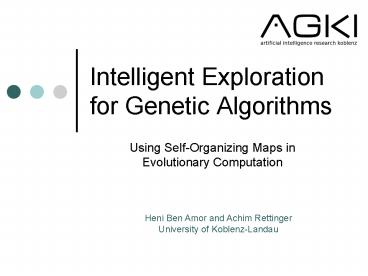Intelligent Exploration for Genetic Algorithms - PowerPoint PPT Presentation
1 / 29
Title:
Intelligent Exploration for Genetic Algorithms
Description:
To regain diversity we employ reseeding of a set of individuals into the ... Reseeding ... Question: How much individuals should we reseed in each generation? ... – PowerPoint PPT presentation
Number of Views:48
Avg rating:3.0/5.0
Title: Intelligent Exploration for Genetic Algorithms
1
Intelligent Exploration for Genetic Algorithms
- Using Self-Organizing Maps in Evolutionary
Computation
Heni Ben Amor and Achim Rettinger University of
Koblenz-Landau
2
Outline
- Problem Statement
- GASOM Approach
- Self-Organizing Maps
- Mining the Evolutionary Search
- Enhancing the Evolutionary Search
- Adapted Fitness Evaluation
- Reseeding
- Balancing Exploration and Exploitation
- Evaluation and Results
3
Problem Statement
- Genetic Algorithm is a popular technique for
optimization - Reoccuring phenomenon
- Getting stuck in local optima
- Premature Convergence
4
Problem Statement
- Popular explanation for PC Loss of Diversity in
Population - Previous Work centered on Diversification
- Incest Prevention
- Seduction
- Sharing, Niching, Crowding
- Real Problem
- Balance of Exploration a. Exploitation
5
GASOM Approach
- GASOM Genetic Algorithm with Self-Organizing
Maps (SOM) - GASOM features
- Explicit representation of search history
- A fitness evaluation promoting novelty
- A reseeding Operator preserving exploratory power
- Control of Exploration a. Exploitation
6
Self-Organizing Maps
- Class of Neural Networks
- Good for dimensionality reduction
- Retains cluster properties
- Standard procedure
- Perform projection from high-dimensional spaces
onto a grid - This is achieved through a training
7
Self-Organizing Maps(Example)
Training the SOM to map a color-space onto a grid
8
Self-Organizing Maps
- Neurons compete againts each other
- The neuron which is most similar to the input
vector is activated - Best Matching Unit (BMU)
9
Mining the Evolutionary Search
- Train a Self-Organizing Map with a large number
of chromsomes at the beginning of the
optimization run - During evolution for each chromosome processed
increase the counter of the corresponding BMU
10
Mining the Evolutionary Search
An SOM trained to map the chromosome space
11
Mining the Evolutionary Search
The fitness of each neuron in grayscales
12
Mapping the Population
13
Tabular Representation
Population Distribution Table
Search History Table
All previously seen individuals
Individuals of current population
14
Adapting the Fitness Evaluation
- Individual is rewarded if it is located in
unexplored regions of search space - gt reward if individual is novel
- Fitness of an individual based objective value
(simple fitness) and novelty - Novelty is computed based on the values from the
search history table
15
Adapting the Fitness Evaluation (Example)
Low Novelty
16
Adapting the Fitness Evaluation
- Computing Novelty
Chromosome
Search history table
BMU of chromsome c
17
Adapting the Fitness Evaluation
- Rank all Individuals based on novelty value
- Rank all Individuals based on objective value
- New fitness is the sum of both Ranks
18
Reseeding
- Population diversity might get lost
- To regain diversity we employ reseeding of a set
of individuals into the population - Reseeding also used in GADO Rasheed et.al and
CHC Eshelman. et al
19
Reseeding
- Simple reseeding strategies
- Reseed old individuals
- Reseed random individuals
- GASOM reseeding strategy
- Reseed individuals in less explored regions
- Lookup Search History Table
20
Reseeding
- Possible Scenario
- Problem
Reseed from this part of the search space
How do we know which Individuals are in this
part of the search space?
21
Reseeding
Neuron
- Use a Reseeding Pool
- Each Neuron is
- connected to a bucket
- of individuals from that part of the search
space - The bucket of each neuron has to be filled with
individuals
Bucket
1001000011001011
1001010011001011
1001000011101011
100000011001011
1001000011001000
1001000011101011
1001000010001001
22
Reseeding
- Creating the Reseeding Pool
- Create random individual
- Find BMU of individual
- Assign the individual to reseeding bucket of the
particular BMU - GOTO 1 until all buckets full
23
Reseeding
PopSize 100 Mutation 0.03 CrossOver
0.7 Chromosome Length 16bit Problem
Max1 Reseeded individuals 10
Average Hamming Distance of reseeded individuals
to all previously evaluated individuals
24
Balancing Exploration and Exploitation
- Question How much individuals should we reseed
in each generation? - (needed Exploration current exploration)
- Current exploration Number of different
activated neurons in the Population Distribution
Table - Need exploration Given by a balancing function
25
Balancing Exploration and Exploitation
- Balancing Function
- Percent of neurons that should be activated
26
Evaluation and Results
- Average fitness
27
Evaluation and Results
- Number of times global optimum was found (out of
100)
28
Questions ?
29
Self-Organizing Maps































